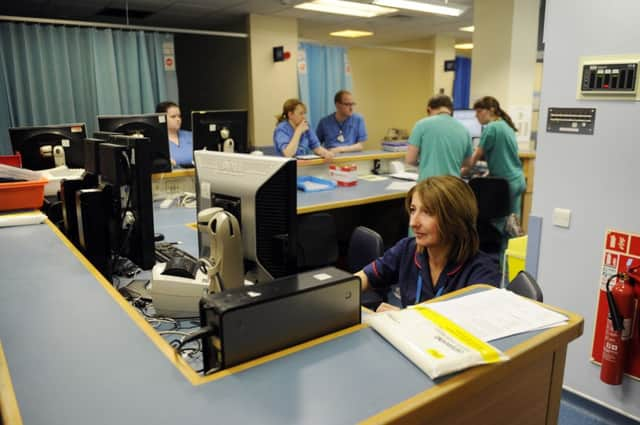Leaders: NHS needs reform by evolution


According to Dr Brian Keighley, chairman of the British Medical Association in Scotland, reports of stress and burnout are now emerging from all clinical grades of staff across Scotland. His warning chimes ominously with a similar message from the Royal College of Nursing earlier this month that nurses are working overtime for free in order to hold a creaking health service together.
Both the BMA and the RCN are trade unions whose job is to secure better pay and conditions for their members, so there is a temptation to take their warnings with a pinch of salt.
Advertisement
Hide AdAdvertisement
Hide AdBut they are also both significant bodies, so their common message should be heeded as more than just a call for more money to be put into the NHS. Neither are the causes of their concerns too hard to discern. Scotland’s population is ageing and the older the population gets, the more demands will be made on the health service. Treatments for previously untreatable conditions are constantly becoming available, many of which are expensive, both in terms of the drugs being used and the staff required to administer them.
Patients and their relatives know this and, since faith that the NHS is amongst the best health services in the world is strong, they expect that these cures should be available to all, everywhere. This rising expectation of an always-improving health service also extends to it being fully available at weekends as well as the five working days of the week.
In assessing how these increasing demands might be met, Dr Keighley makes two important points. Firstly, he contends that politicians should be open with the public that there is a limit to how much money can be spent on the NHS. This may seem obvious. Everyone knows that there is less taxpayers’ money than there used to be. The problem here, however, is political. The moment any politician starts saying this in the context of talking about the NHS, their opponents leap on it as evidence that cuts are being planned.
This is where Dr Keighley’s second point is important. He acknowledges that there is a case for reform – changing systems of work and procedure so that existing staff and money can achieve more. This, he contends, should be a matter of evolution rather than revolution – a gradual change of direction rather an abrupt about-turn.
Politicians, however, tend not to like this kind of reform as it seems gradual, piecemeal, and unambitious. But in trying to meet expectations which are rising faster that the resources available to meet them, an evolving NHS seems like the strategy most likely to succeed.
Andy knighthood knock-back not on
ALL British tennis fans, and quite a few non-tennis aficionados as well, waited 77 years for a home winner of the men’s singles Wimbledon championship. But, according to those in charge of handing out honours, Andy Murray’s thrilling win in the summer came too soon.
Really? It seems that because he received an OBE last year, it was too soon to award him a knighthood for attaining the pinnacle of achievement in men’s tennis. Good grief. Doesn’t the fact that it was 77 years since the last men’s singles champion indicate something about just how hard it was for Mr Murray to win his title, and thus what a huge achievement it was?
Conspiracy theories that Mr Murray was absent from the New Year’s honours lists because he was a Scot, or because he sometimes comes across as a bit dour, can be discounted. This reasoning, that it was “too soon”, sounds to be the authentic voice of stuffy British establishmentarianism, obsessed with observing protocols rather than recognising popular success.
Advertisement
Hide AdAdvertisement
Hide AdHonours are awarded to sports stars because they are inspirational. Cycling’s Sir Chris Hoy and Sir Bradley Wiggins have inspired a new generation of thousands of young people to get off the couch and to aim to be the best.
Mr Murray’s win, in front of tens of millions of television viewers, has done exactly the same, for thousands of racket-wielding youngsters.
So why wait to honour him for that achievement? He has said himself that whatever other success he goes on to record in his career will not top the grasping of that particular sporting holy grail.
If ever there was an example of humbug, this is it.